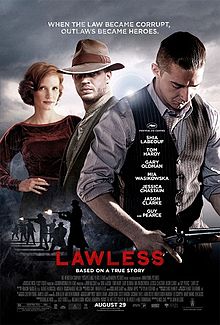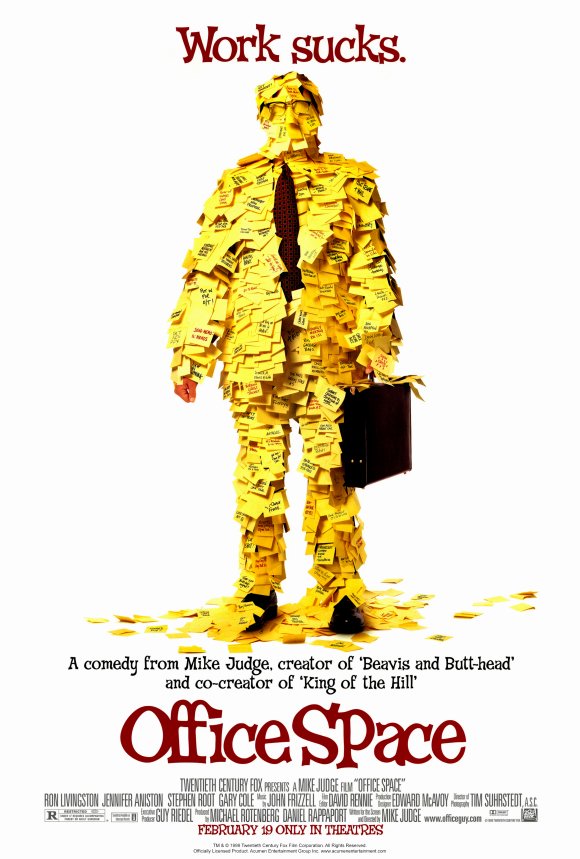We start the Top 7. You finish the Top 10.

This week’s “Question of the Week” on Jeff Bayer’s “Movie B.S.” podcast is inspired by Lawless, a film about three good 'ol boys (played by Shia LaBeouf, Tom Hardy, and Jason Clarke) in Virginia's Franklin County whose bootleggin' ways in the 1930s are trifled by dirty cops and powerful competition. (I reviewed the film, and you can read that review here!)
This week's inquiry is, “What is your favorite moment of law-breaking in a movie?”
In my attempt to answer this question, I'm going to choose scenes that are my favorite because of the impression they've left on me. Some of these law-breaking moments are fun, some are serious, and some of them are never responded to with justice. These are scenes that left an impact concerning the control of power (or lack thereof), while also toying with the order that is expected of following the law.
Here's My Top 7 Favorite Law-Breaking Moments in Movies ...
7. The Bellagio Vault Heist in Ocean's Eleven (2001)
Recap: Danny Ocean (George Clooney) and his motley crew of slick thieves (including Matt Damon, Brad Pitt, Elliott Gould, Bernie Mac, Casey Affleck, Scott Caan, and Shaobo Qin) steal $150 million from under the snotty nose of evil casino owner Terry Benedict (Andy Garcia). Reason: I can imagine that stealing from a very rich man with powerful friends would be a stressful experience. But the fun of Ocean's Eleven is that it turns such a heist into a fun walk in the park, albeit one with a couple of stumbles, but certainly some skips too. As tense as an amusement park ride, it's the type of heist that should be recreated by a Las Vegas tourist agency and sold as a Groupon package. This heist has great scenery, great tour guides, and even a slick soundtrack.
6. Ferris Bueller's day off in Ferris Bueller's Day Off (1986)
Recap: With sneaky bedroom mechanical engineering, future con artist Ferris Bueller (Matthew Broderick) convinces both his parents and nosy members of academic authority that he's having a sick day. Reason: OK, this isn't exactly "law-breaking," and it isn't exactly just a "moment," but such a clever defiance of the rules deserves a place on this future Pulitzer Prize-winning Top 7. With these calculated shenanigans, mixing both acute understanding of adult naivety with a brash taste for the spectacle, Bueller proves to be the best kind of criminal. One can only imagine the types of Ponzi schemes he would try to pull off just five years out of business school.
5. William Forsythe randomly shooting that woman in the head in Out for Justice (1991)
Recap: Raging in this classic Steven Seagal film as the portly psychopath Richie Madano, Forsythe's character continues his Joker-esque spree in a moment of traffic. In jerk reaction to a woman complaining to him that he has caused traffic, he yanks her from out of her car window, and shoots her point blank in the head. His dumb haircut is icing on the silly cake. Reason: In the realm of dark, dark, dark comedy, this is one of the funniest murders ever. In classic Steven Seagal movie fashion (in this one he plays a Brooklyn cop named Gino Felino), it is an over-the-top moment in which the villain's attempts at being disgraceful becomes gooey cheese. Instead, he is a character of such ridiculous over-seriousness, especially with that unfortunate gap tooth, that I giggle like a 12-year-old after her first kiss whenever I see this scene. Every. Single. Time.
4. Cop Car Pileup in The Blues Brothers (1980)
Recap: Rogue blues musicians Jake (John Belushi) and Elwood (Dan Aykroyd) craftily evade a swarm of cop cars, causing the police vehicles to smash into each other in nightmarish piles. Reason: Of all of the laws broken in this movie, the evasion of police in The Blues Brothers might make for the most exciting of gags. It is utter car chaos, fitting for monster truck rallies or the nightmares of insurance agents, or worse, the taxpayers who'll find out their cities justice force have trashed all vehicular manpower. So not only does it have the classic law-breaking of avoiding police control, it also has the embarrassment of justice, turning authorities into clown-like spectacles.
3. That Awesome Heist in Rififi (1955)
Recap: The center moment of this classic French crime movie is a half-hour heist, presented in full detail, without dialogue, or music. I would show you this clip, but maybe Youtube is still mad at director Jules Dassin for that whole Red Scare thing. Reason: Crime is captured with great calmness with this scene in Rififi, which presents a jaw-dropping heist of exquisite precision without any flair. It's so engrossing that this half-hour might be one of the fastest 30 minute sequences in film. Coming together in criminally beautifully ways, this is the heist that all movies of the subgenre dream about pulling off themselves.

2. Curb-Stomping in American History X (1998)
Recap: Neo-Nazi Derek (Edward Norton) earns voluntary manslaughter for curb-stomping a gang member who tried to steal Derek's father's truck. Derek is sent to prison for a life- (and perspective) changing three years. Reason: Breaking the law is all evil fun and games until you get sent to prison, where you get your ass kicked (to put it nicely). It's an easy rule that's given a stark reality with this scene in American History X, in which everything changes for the characters, and the tone of this movie (even the visual's coloring resorts to stark black and white film).
1. Milton burns down oppressive software company Initech in Office Space (1999)
Recap: Saving office cubicle hero Peter Gibbons from jail time (and being called a "bad person" in court), disgruntled employee Milton (Stephen Root) strikes back at the company that stole his beloved Swingline stapler. He doesn't get any jail time, but escapes to a beach where he can wear a shirt that says "I Ate the Worm!" in peace. Of course, the waiter gets his drink order wrong ("I said no salt, no salt!" Milton says.) Reason: And then, unlike the ways taught by American History X, sometimes destructive law-breaking is not punished. Sure, this is a silly ending, but it's both perfect for the film, and a great example of the cause-and-effect (relating the separate dramas of Peter with Milton's stapler woes). In a much simpler way, it's also a great reminder of dumb luck. Plus, apparently no one got hurt in this act that liberates workers like Peter. This conclusion reminds us that the definition of justice is not always black and white.
